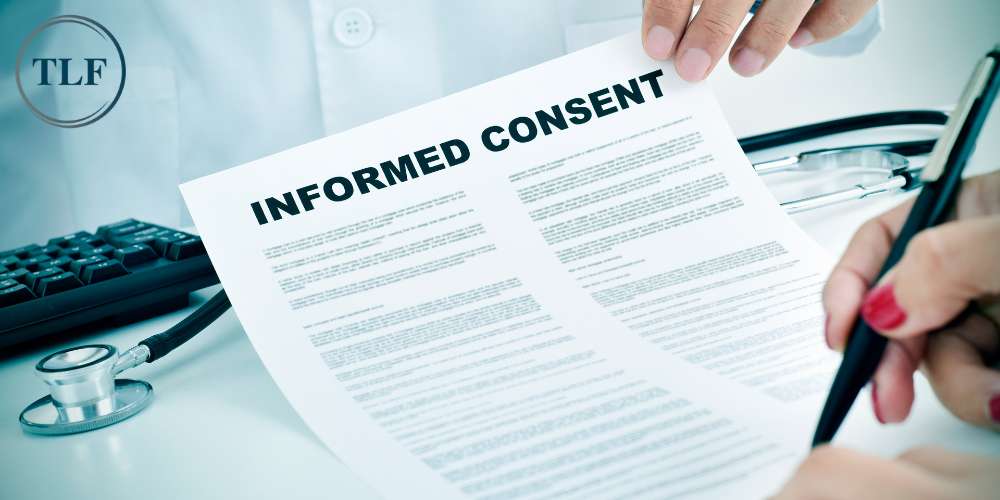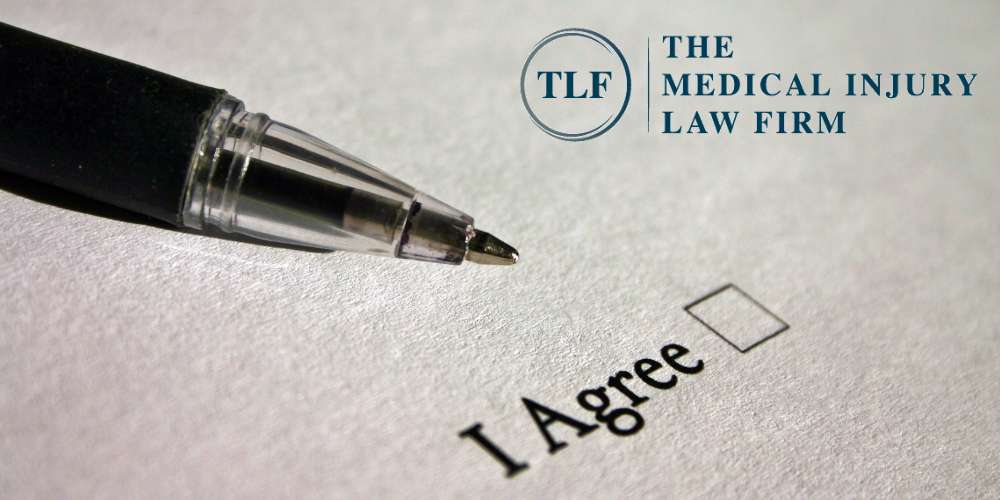When it comes to undergoing any treatment or medical procedure, a patient’s consent is a crucial element. This is not just a formality but a fundamental right. Understanding consent is crucial for both patients and healthcare professionals, as it ensures that the patient’s agreement to a procedure or treatment is based on full awareness of the procedure’s nature, benefits, risks, and alternatives.
At TLF: The Medical Injury Law Firm, we recognize the significance of this informed decision-making process as it pertains to many legal relationships, especially within the healthcare setting, and are dedicated to keeping our readers informed and prepared. In the case that your medical provider did not obtain proper consent from you, and you were ultimately injured as a result, you may have a medical malpractice claim. To discuss the potential of your case with an experienced medical malpractice attorney from our firm, call (800) 698-4054 today.
What is Express Consent?
Express consent refers to clear and direct statements from a patient that provide medical personnel with the agreement to proceed with a specific medical treatment or procedure. This form of consent is crucial for ensuring that the patient has made an informed decision, having been fully briefed on the details, risks, benefits, and alternatives associated with the treatment in question.
To provide consent, the patient must articulate their approval in an unmistakable manner, typically through a verbal affirmation or by signing a consent form, thereby ensuring that the medical team has the explicit authorization to proceed.

Expressed Consent Definition
According to 18 USC § 2725(5), “‘express consent’ means consent in writing, including consent conveyed electronically that bears an electronic signature.
Informed Consent vs. Express Consent
The main difference between express consent and informed consent lies in the scope and manner of the patient’s agreement to undergo medical treatment. Express consent is a specific type of consent that is clearly and explicitly given by the patient, either verbally or in writing, without any ambiguity. It directly indicates the patient’s permission for a particular procedure or treatment.
In contrast, informed consent is a broader concept that not only includes obtaining the patient’s express consent but also ensures that the consent is given based on a full understanding of the treatment’s nature, risks, benefits, and alternatives. Informed consent involves a comprehensive process where medical personnel provide detailed information to the patient, enabling them to make a well-informed decision about their care.
Implied Consent vs. Express Consent
The main difference between express and implied consent lies in how the consent is communicated by the patient to the medical personnel. Express consent is given explicitly, either orally or in writing, indicating a patient’s clear agreement to undergo a specific medical treatment or procedure. It is a direct and unmistakable affirmation of the patient’s choice, often documented through a signed consent form or a clear verbal statement in the presence of witnesses.
Implied consent, on the other hand, is not explicitly stated but rather inferred from a patient’s actions or the circumstances. For example, a patient’s non-verbal behavior, such as extending their arm for a blood draw, can prove implied consent for that specific procedure. Implied consent is often relied upon for routine or non-invasive procedures where the patient’s cooperation implicitly indicates their agreement. Implied consent may also occur if life-saving treatment is needed while a patient experiences a complication during a surgery.

Examples of Expressed Consent
Expressed consent is explicitly given by a patient before undergoing any specific procedure or treatment, indicating a clear and voluntary agreement to the medical intervention. Here are a few examples of expressed consent in healthcare settings:
- Signing a Consent Form for Surgery: Before a surgical procedure, patients are often required to sign a detailed consent form. This document outlines the nature of the surgery, the risks involved, potential benefits, and alternative treatments. By signing this form, the patient provides expressed consent to proceed with the surgery. If you are presented with a “pen pad” and asked to sign, you have the right to, and should read and request a copy of anything to which your electronic signature is applied.
- Verbal Agreement for Medication Administration: Before administering a new medication, a healthcare provider explains its purpose, benefits, side effects, and potential risks. The patient then verbally agrees to start the medication regimen, providing expressed consent for this specific treatment.
- Written Consent for Participation in Clinical Trials: Patients who participate in clinical trials are required to sign informed consent documents. These documents detail the trial’s purpose, procedures involved, potential risks, and benefits. By signing, participants provide expressed consent to be part of the trial and to undergo the treatments or procedures outlined in the study protocol.
- Verbal Consent for Minor Procedures: For minor procedures such as a seasonal flu shot or getting your blood drawn, a healthcare provider may explain the procedure and ask for the patient’s verbal agreement. The patient’s affirmative response serves as expressed consent for the procedure.

Types of Expressed Consent
Expressed consent be in either verbal or written form, or both. Each type plays a crucial role in ensuring that patients are fully informed and agree to a procedure or treatment before it is carried out.
Verbal consent is often used in situations where a procedure is minor, non-invasive, or in emergency scenarios where obtaining written consent might be impractical. However, verbal consent should still be documented in the patient’s medical records, noting the details of the discussion, the patient’s understanding, and their agreement to the proposed treatment.
Written consent is a more formal and tangible expression of a patient’s decision to undergo a specific medical intervention. Written consent is typically required for more significant, invasive, or risky procedures. It involves the patient (or their legal representative) signing a consent form that outlines the nature of the treatment, its risks, benefits, and potential alternatives.
Both verbal and written forms of expressed consent are fundamental to patient autonomy, ensuring that individuals have a say in their health care and that their legal rights are protected.
What are the Legal Requirements for Expressed Consent?
Legal standards for obtaining expressed consent in medical practices mandate clear communication of possible risks, benefits, and alternatives of any procedure or treatment. This ensures patients make the right decisions for themselves based on the information provided.
For particularly invasive procedures or treatments, express consent often requires written documentation, including a detailed discussion of risks and the patient’s understanding. Failure to adhere to these standards can lead to a potential medical malpractice lawsuit.

The Importance of Expressed Consent in Medical Practice
To obtain express consent is not just a procedural step; it’s a foundational element of patient care and ethical treatment. This process involves a transparent dialogue between healthcare providers and patients, where information about the procedure or treatment is discussed thoroughly. Express consent ensures that patients are fully informed about the risks, benefits, possibility of unexpected complications, treatment alternatives, and potential consequences of non-treatment before agreeing to proceed.
By ensuring that express consent is obtained, medical professionals safeguard both the patient’s welfare and their own practice against potential misunderstandings and disputes.
Can You Sue for Lack of Expressed Consent?
Yes, you can sue for lack of expressed consent. In medical malpractice cases, the failure to obtain express consent before proceeding with a procedure or treatment is a medical breach of duty and can lead to legal action. Patients have the right to make informed decisions about their healthcare, and when medical professionals do not secure express consent and the possible injuries or adverse outcomes that would have been included in a consent actually occur, there may be a claim. Additionally, this oversight can result in the patient experiencing outcomes or complications for which they were not adequately prepared.
If harm or injury results from a procedure carried out without proper expressed consent, it may form the basis of a medical malpractice lawsuit. In such cases, demonstrating that the lack of consent directly contributed to the harm or injury experienced by the patient is necessary for a successful legal outcome.

Protecting Patient Rights: TLF’s Approach
When a medical professional fails to obtain proper consent, it not only undermines the patient’s autonomy but may also lead to unwarranted medical procedures with harmful consequences. Understanding the impact of these violations, TLF: The Medical Injury Law Firm stands at the forefront of advocating for victims of medical malpractice, including cases involving violations of express consent.
The firm’s approach encompasses a comprehensive evaluation of the consent process, the communication between the patient and healthcare provider, and the resulting medical outcomes. By doing so, our Northern Kentucky and Cincinnati medical malpractice attorneys at TLF aim to hold responsible parties accountable, seeking justice and compensation for victims and their families.
Call the Ohio and Northern Kentucky Medical Malpractice Attorneys at TLF Today
If you believe you or a loved one has been a victim of medical malpractice, do not hesitate to reach out for help from the experienced attorneys at TLF: The Medical Injury Law Firm. We are fully dedicated to advocating for the rights and well-being of patients affected by such breaches in medical care and are committed to ensuring you receive the justice and compensation you deserve.
Contact our Ohio and Kentucky medical malpractice law firm for a free consultation to discuss your case and explore your legal options today. You can reach our Covington law office at (859) 898-2472, our Cincinnati law office at (513) 643-1689, or toll-free at (800) 698-4054.

